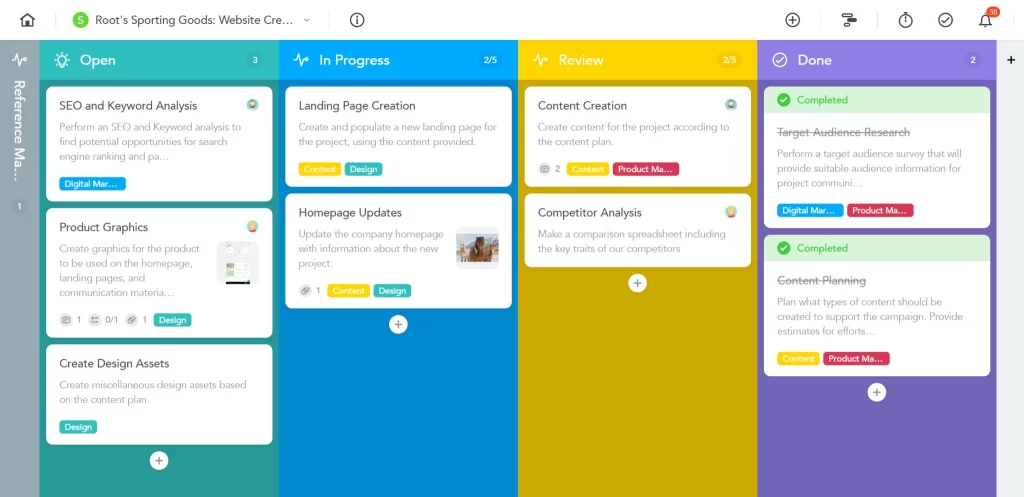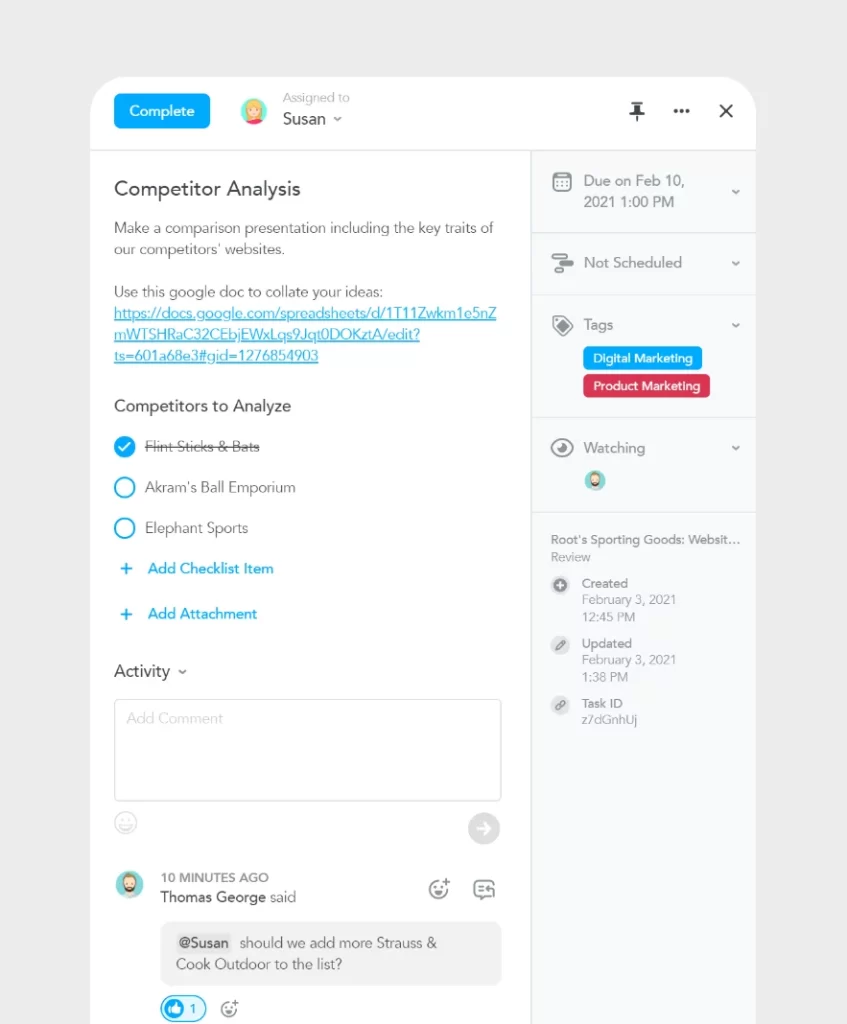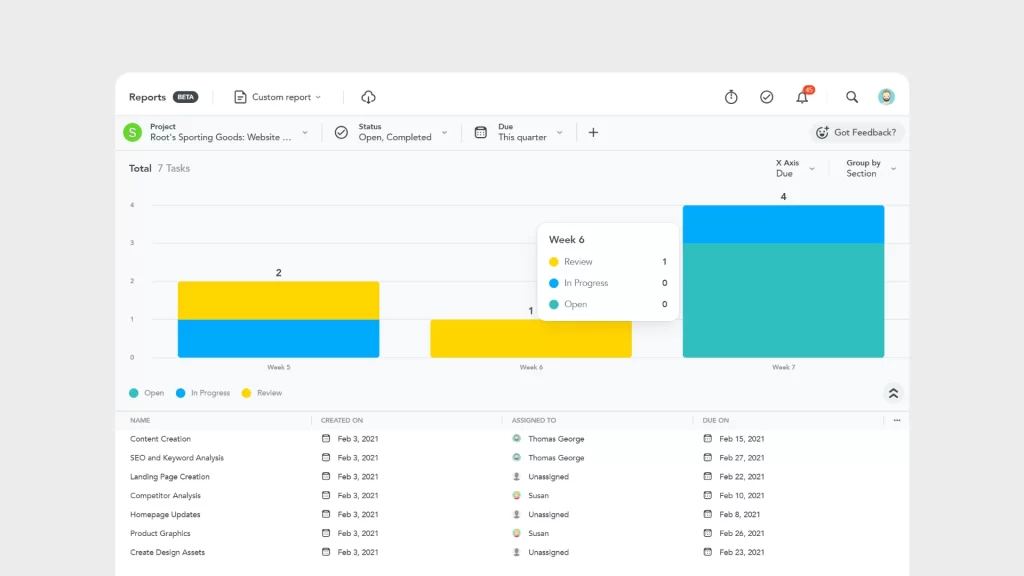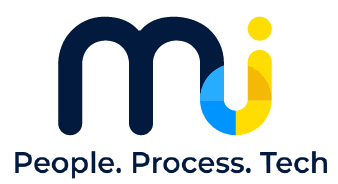Task management is the key link between planning to do something and getting it done. With plenty of choice on the market, we look at why MeisterTask is the best online task management solution for teams and individuals looking to work more effectively, efficiently and consistently.
Recently, we examined the key similarities and differences between project management and task management, focusing on how choosing the right tool to handle your company’s workflows could lead to huge advantages for your team. In this post, we look specifically at how the wide range of features available with MeisterTask can address some pressing problems for modern businesses. Here’s what’s coming up:
- What is task management?
- Key features in MeisterTask that make task management more effective
- How to sign up and start using MeisterTask
What is Task Management?
Even if you’ve never thought about it before, you’ve probably been practicing task management for your entire working life. You might have written a to-do item down in an email, a sticky note, or even on the back of your hand. Every time you think about something you need to do, make a plan to do it, then complete it… that’s task management.
However, when modern business refers to task management, what is generally meant is the structured, digitalized processing of tasks using a dedicated software. Our own task management tool, MeisterTask, is an excellent example, but many others exist on the market as well.
The aim of any task management system is to provide an overview of work in progress that enables tracking from conception to completion. Kanban software and checklist apps are both examples of such systems. The goal is similar to that of a project management tool, but the two are normally split: while projects have clear deliverables, a start and an end date, tasks are usually more general or less dependent on time. For the sake of clarity, task management is defined as any activity that falls outside the scope of project work. Examples of common tasks include:
- Ongoing or recurring tasks, such as scheduled inventory checks or comment moderation on a company blog or website.
- “Daily business” tasks, such as replying to emails, time-logging and other administrative activities.
- “One-off” tasks, which are unconnected to other projects or workflows.
Making Task Management Work with MeisterTask
There are many problems with “informal” types of task management: scribbled notes, memorizing and the like. Poor methods lead to substandard results, so even if you can’t see the exact causes of ineffective working, you will probably notice the effects over time. The feeling that nothing gets done efficiently, the realization that people were left outside the loop in important discussions, and the sense that your team is pulling in different directions: these are all symptoms of suboptimal task management.
In other cases, tasks that could bring value to an organization might simply be forgotten — slipping through the cracks because no formalized system is in place. This general feeling of low productivity is shown in the sheer amount of wasted time that an average employee accrues over time. For example, an “average” employee:
- Spends more than two hours every day searching for information in emails, shared directories and the like.
- Spends more than 5 hours per week duplicating work that is already in progress.
- Costs their company over $12 000 annually in “lost” productivity.
In this section, we’ll look at some common issues and examine how MeisterTask can help you boost productivity through its simple, effective task management features.
The problem: I can’t see what my team is working on and when tasks will be completed.

This is a common complaint. Even if analog methods can help individuals complete tasks — whether that’s on paper or a more sophisticated solution — its benefits will be limited if they’re the only one who can see the process. Effective collaboration is the key to working successfully in teams, a mindset that is made easier to implement company-wide with a certain degree of transparency. Expert opinion leans towards the view that transparency can lead to both rapid problem solving and an improved corporate culture built on trust and natural bonds.
If you can let go of the work silos and make to-dos and workflows visible to all the members of your team, this will help colleagues synchronize their own tasks with each other and allow you to allocate resources more effectively.
The solution: Kanban boards.

Kanban boards pre-date MeisterTask: with their origins in the Japanese automotive industry, they have been used by teams to visualize workflows since the late 1940s. The method is about more than simply establishing an overview. As soon as project work is flowing according to a Kanban structure, you will be able to maximize efficiency by streamlining processes and identifying bottlenecks in your workflows, for example tasks that have been stuck in the same section for a long time. This blend of accessible, high-level overview and the capacity to take decisive actions is key to keeping tasks moving.
The benefit of MeisterTask’s Kanban-style project boards is clear once you start using the tool. Not only does MeisterTask help you digitalize your workflows, its clear, beautiful interface helps you gain a clear overview of task progress at-a-glance. Better still, the tool’s simplicity means that it is fun and easy to use: perfect for getting the rest of your team on board.
Here’s how you can make MeisterTask’s Kanban boards work to your advantage:
- Invite team members to your project boards so that they always have an overview of what’s being worked on.
- Assign tasks quickly and easily to the responsible team members to ensure work is delegated effectively. Know who is doing what, when.
- Create sections in your project board that show task status. A simple “Open” -> “In Progress” -> “Review” -> “Done” workflow (see screenshot above) might be adequate for your needs, but you can customize your board with unlimited sections so that it matches your workflow exactly.
- Set WIP (work in progress) limits for these sections to make it clear whenever a task overload occurs.
The problem: My team spends too much time on emails and not enough on work.
For thousands of companies around the world, this is the big problem: the ultimate productivity blocker that stops growth, stagnates processes and is a major cause of employee frustration. The issue comes down to a “what” — alignment — and a “how” — communication. Teams need to get everyone on the same page, and to do this, ramp up the scale of their emails and meeting schedules. In other words, they dedicate more time away from productive work.
The phenomenon is particularly noticeable in small companies that grow quickly. While less-structured communication methods are generally effective for smaller groups, what works for a half-dozen people will start to show flaws when applied to 25, and certainly won’t work with 100. However, perhaps almost as staggering as the scale of the problem is the relative simplicity of addressing it.
The solution: Keep the communication on the task.

The answer to the questions that alignment poses is not “more communication” but “better communication”. If information is centralized and everyone that needs to know has access to it, things don’t need to be repeated. In MeisterTask, the person responsible for completing the task is designated as the “assignee”, whereas all other stakeholders become “watchers”, establishing a group of interested people at an early stage.
In the task itself, MeisterTask centralizes the task description, comments, attachments and a log of task changes in a way that is trackable and interactive on the task itself. You can even use emoji reactions to comments to confirm to colleagues quickly that you have read their input.
You can define notification settings so that you’ll still be alerted by email when a task is changed. Additionally, if you need to keep an eye on all the tasks on a project board, you can simply watch the project to stay in the loop.
The problem: I have no overview of how well my team works. How can I optimize their workflows?
If you’re a manager, a key responsibility is ensuring that your team works as efficiently and effectively as possible: in other words, making sure that tasks get done. However, when your team’s activities are strewn across a mishmash of emails, scraps of paper and verbal requests, achieving an overview is essentially impossible. Without structure, reporting becomes something of a vague process that generates insights with minimum value or no insights at all.
The solution: Use MeisterTask Reports for quick, clear insights.

MeisterTask provides valuable insights by collecting information about tasks and projects and presenting this in a way that is easy for managers to understand. Once you are clear on the overall picture of productivity in a project, it becomes much easier to take measures that ensure more gets done.
By using MeisterTask as a digitalized task management solution, information about your tasks can be used to generate various types of statistics. Using only the core information, you’ll gain a big-picture overview into various important metrics, customizable to show different levels of detail.
The faster you can find bottlenecks and overloads in your workflow, the easier it becomes to make your processes smoother and more efficient. Inside the customizable reports interface, you can switch effortlessly between views to pinpoint what’s been done and which tasks still need completing.
The problem: My team works slowly because we’re spending too much time on manual click-work.
If you have a productivity problem, you’ve probably already tried at least one tool to fix the issue. However, many teams fall into similar traps when it comes to choosing new software: the time it takes to use the tool outweighs the benefits in productivity it brings. This is a potential issue with task management software too: excessive efforts invested into keeping the system managed could slow you down.
The solution: Keep it simple. Then, automate it!
Simplicity is key. The more streamlined your task management system is, the more value you’ll be able to get out of it. MeisterTask is a tool that makes your tasks easier to manage, not a task in itself. Our focus on a smooth user experience helps you and your team achieve maximum productivity with minimum fuss: users love MeisterTask because it’s simple, fast and intuitive. Best of all, MeisterTask’s user-friendliness directly translates into higher user acceptance — it’s so easy to use that users actually use it.
Once you’re up and running with MeisterTask, you can also take advantage of automations to speed up your team’s work even further. Intelligent automations can take the strain off your team, allowing you to focus your team’s efforts on what really matters. Some of the most important automations include:
- Add tags. When a task is moved to a new section, this automation adds selected tags to the task automatically.
- Assign to user. With this automation, tasks are automatically assigned to new users when moved to a new section.
- Update status. This automation changes the task status when it is moved, for example completing a task when it is moved to the “Done” section.
Sign up. Get productive!
By now, we’re sure you’ll be convinced of the benefits of managing your team’s tasks with MeisterTask: a quick and easy way to make task management more consistent, effective and enjoyable for your team. All that’s left to do now is sign up.
Creating a MeisterTask account takes three clicks. Sign up, fill in your details, activate your account and… done! With that taking seconds, the tool can be rolled out to your entire team within minutes. MeisterTask is so easy to use that the time usually reserved for onboarding can be spent working — no training required.
The original content can be checked here.
MI Group has partnered with Fluid Attacks to provide services that contribute to the problems and recommendations discussed in this post.


